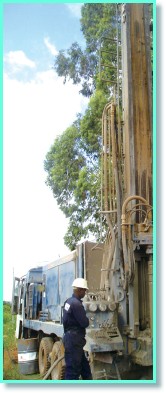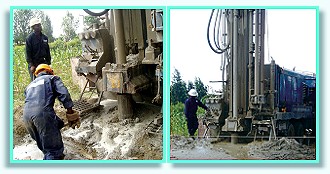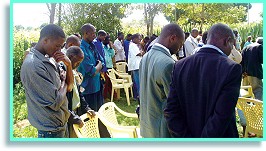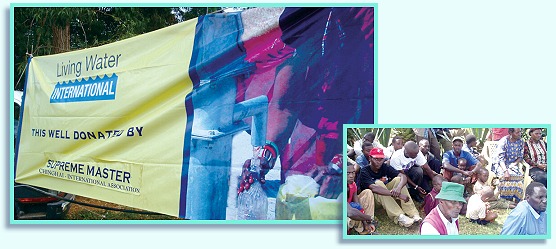|
Love
in Action
Kenya
Ongoing Well-Digging Project to Bring Relief to Drought Victims in Kenya
|
 |
Report based on overseas telephone
interview conducted
by the Taipei News Group, Formosa (Originally in Chinese)
Kenya, a country in east Africa, has long been stricken by droughts that have threatened millions of people’s lives. Very concerned about the situation in Kenya, Supreme Master Ching Hai instructed fellow practitioners to help the local inhabitants dig wells to find sources of water. Upon receiving this instruction, fellow practitioners immediately engaged local companies to launch well-digging projects. Although they did not find sufficient water sources until most recently, both fellow practitioners and well-digging workers have persisted greatly in doing their best, hoping to solve the water supply problem for the local inhabitants as soon as possible.
Due to the gravity of the drought situation and the vastness of the country, it has been necessary to focus on areas close to the capital where the population is dense, transportation is easy, and equipment and technical support are readily available, so that water sources can be found more quickly. Fellow practitioners therefore decided to launch the first well-digging project in Kangundo, a mountain village with 4,000 inhabitants, in order to provide a water supply for the villagers and to give inhabitants in more remote areas access to this water. The high standard for both fellow practitioners and the well-digging company is: “To benefit more people first and to drill fast.” According to the brother initiate who coordinated this project, for several days before signing the contract with the well-digging company in April this year, there were dark clouds in the sky but no rain. However, beginning from the day that the contract was signed, heavy rain poured down and continued for about two weeks. Even up until now, there are occasional showers that continue to temporarily relieve the drought. This is indeed a miracle.
 |
In Kenya, it is necessary to obtain an official permit from the government before digging a well, a process that would normally take about one month. Fortunately, with Master's blessing, fellow practitioners got the permit within one week, even without any endorsement from relevant international organizations. At the end of April, led by a technical expert assigned by the Kenyan government, fellow practitioners and the well-digging workers set off in cars, leaving major highways to ascend into the mountains. Finally they arrived at Kangundo, a mountain village with a population of about 4,000 and always short of water.
The technical expert first selected a spot likely to have water. The well-digging company also estimated that they would reach water at a depth of about 80 meters. Unfortunately, they found that there was none. The leader of the well-digging company decided to dig at another spot and found some water at 120 meters’ depth. However, the water flow was too small and not enough to be sustained in the post rainy season. Then, they decided to dig deeper, to 180 meters. With 20 years' previous experience in well-digging, it was rare that this US-based company could not find water.
Hearing the news that a foreign group had come to dig wells, the inhabitants in the area excitedly came to greet them. In welcoming the team, they mentioned that the rainy season had already passed but that they had not seen normal rainfall that year. The rainy season in Kenya is in February and March, with another shorter season in October and November. The villagers said that there had been very little rainfall over the past two years, resulting in droughts and water shortages everywhere. Local television stations often reported deaths caused by water shortage. However, the government could hardly extend relief to remote areas, and in some places where transportation was inconvenient, it took people hours to go and fetch water. Therefore, the villagers said that they were very lucky to have someone as merciful as the Supreme Master Ching Hai, who was not related to them but who thought about them with love, and who wished to take care of their water supply. They were wholeheartedly grateful to Her and sincerely prayed to God to bless this charitable person. A group of students from Texas, US, who were there for a visit said, "If there were more people in the world who would love and care for others like the Supreme Master Ching Hai, this world would definitely become better."
 |
Villagers praying sincerely. |
As of June 2, the well-digging had reached 160 meters and will continue to 180 meters in the hope of attaining greater water flow. Since many children in the Masai area need help, workers also decided to dig a second well in that area.
According to local statistics, in the last year the number of animals passing through Kenya has dropped dramatically, and many people have died because of the water shortage caused by the drought. Kenya has a population of about 33 million. Existing water supply systems, which rely on natural surface water from rivers and lakes as well as underground water from wells dug by government and international contributors, only satisfy the need of about 13 million people. The lack of water has also forced agriculture to stop, which in turn has caused food shortages. So, people have died not only because of thirst but from hunger as well. Digging wells for more water sources can therefore solve Kenya’s problem from its root.
Fellow practitioners believe that with
Master's love and blessing the well-digging project will become smoother
and more productive. They hope that these actions will lead more international
organizations to launch similar well-digging projects so that people
in Kenya can overcome the hardship caused by the water shortage. They
hope their efforts can enhance Kenya’s water supply system in
the near future, so as to provide inhabitants and innumerable local
animal friends with this sweet nectar of life. As the agriculture and
food supply problems are be resolved one by one, eventually self-sufficiency
can be restored.![]()
 |